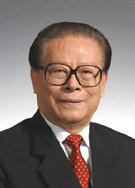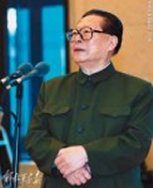Jiang Zemin
 Jiang Zemin died of leukemia and multiple organ failure in Shanghai on 30 November 2022, at the age of 96. The party declared him a “great proletarian revolutionary” and “long-tested communist fighter.”
Jiang Zemin died of leukemia and multiple organ failure in Shanghai on 30 November 2022, at the age of 96. The party declared him a “great proletarian revolutionary” and “long-tested communist fighter.”
Jiang Zemin, born on August 17, 1926, is a native of Yangzhou, Jiangsu Province. Until September 2004 he was chairman of the Central Military Commission of the Communist Party of China (CPC), and chairman of the Central Military Commission of the People's Republic of China.
A surprise choice to lead a divided Communist Party after the 1989 turmoil, Jiang saw China through history-making changes including a revival of market-oriented reforms, the return of Hong Kong from British rule in 1997 and Beijing’s entry into the World Trade Organization in 2001.
Even as China opened to the outside, Jiang’s government stamped out dissent. It jailed human rights, labor and pro-democracy activists and banned the Falun Gong spiritual movement, which the ruling party saw as a threat to its monopoly on power.
Jiang was on the verge of retirement as the party secretary for Shanghai in 1989 when he was drafted by then-paramount leader Deng Xiaoping to pull together the party and nation. He succeeded Zhao Ziyang, who was dismissed by Deng due to his sympathy for the student-led Tiananmen protesters.
In 13 years as party general secretary, China’s most powerful post, Jiang guided the country’s rise to economic power by welcoming capitalists into the party and pulling in foreign investment after China joined the WTO. China passed Germany and then Japan to become the second-largest economy after the United States. Jiang captured a political prize when Beijing was picked as the site of the 2008 Summer Olympics after failing in an earlier bid.
A former soap factory manager, Jiang capped his career with the communist era’s first orderly succession, handing over his post as party leader in 2002 to Hu, who also took the ceremonial title of president the following year.
He participated in the students' movement led by underground CPC organizations around 1943 and joined the CPC in April 1946. He graduated from the Electrical Machinery Department of Shanghai Jiaotong University in 1947.
After the liberation of Shanghai, he served successively as deputy engineer, chief of the works section and concurrently head of the power workshop, Party branch secretary and first deputy director of Shanghai Yimin No. 1 Foodstuff Factory, first deputy director of Shanghai Soap Factory, chief of the electrical machinery section of Shanghai No. 2 Design Division of the First Machine-Building Industry Ministry.
He worked as a trainee at the Stalin Automobile Works in Moscow in 1955.
 Upon returning to China in 1956, he worked as deputy chief of the dynamic mechanics division, deputy chief engineer for dynamic mechanics of the First Automobile Plant in Changchun and director of the power factory in the plant.
Upon returning to China in 1956, he worked as deputy chief of the dynamic mechanics division, deputy chief engineer for dynamic mechanics of the First Automobile Plant in Changchun and director of the power factory in the plant.
After 1962, he served successively as deputy director of the Shanghai Electrical Equipment Research Institute under the First Machine-Building Industry Ministry, director and acting Party committee secretary of the Wuhan Heat-Power Machinery Institute under the Ministry, deputy director-general and director-general of the Foreign Affairs Bureau of the First Ministry of Machine-Building Industry.
After 1980, he served as vice chairman and concurrently secretary-general of the State Administration Commission on Import and Export Affairs and the State Administration Commission on Foreign Investment and a member of the Leading Party Member Groups of the two commissions.
After 1982, he served as first vice minister and deputy secretary of the Leading Party Member Group of the Ministry of Electronics Industry and minister and secretary of the Leading Party Members' Group of the Ministry.
After 1985, he served as mayor of Shanghai and deputy secretary and secretary of the Shanghai Municipal Party Committee. He was elected member of the CPC Central Committee at the Twelfth CPC National Congress in September 1982.
In November 1987, he was elected member of the Political Bureau of the CPC Central Committee at the First Plenary Session of the Thirteenth CPC Central Committee. In June 1989, he was elected member of the Standing Committee of the Political Bureau and general secretary of the CPC Central Committee at the Fourth Plenary Session of the Thirteenth CPC Central Committee.
In November 1989, he was elected chairman of the CPC Central Military Commission at the Fifth Plenary Session of the Thirteenth CPC Central Committee.
In March 1990, he was elected chairman of the Central Military Commission of the People's Republic of China at the Third Session of the Seventh National People's Congress. In October 1992, he was elected member of the Political Bureau, its Standing Committee and general secretary of the CPC Central Committee and chairman of the CPC Central Military Commission at the First Plenary Session of the Fourteenth CPC Central Committee.
In March 1993, he was elected president of the People's Republic of China and chairman of the Central Military Commission of the People's Republic of China at the First Session of the Eighth National People's Congress.
In September 1997, he was elected member of the Political Bureau and its Standing Committee and general secretary of the CPC Central Committee and chairman of the CPC Central Military Commission at the First Plenary Session of the Fifteenth CPC Central Committee. In March 1998, he was reelected president of the People's Republic of China and chairman of the Central Military Commission of the People's Republic of China at the First Session of the Ninth National People's Congress.
Jiang relinquished his leadership of the party in November 2002 after 13 years at the helm. In November 2002, he was reelected chairman of the CPC Central Military Commission at the First Plenary Session of the Sixteenth CPC Central Committee.
On March 15, 2003, he was reelected chairman of the Central Military Commission of the People's Republic of China. At that time he gave up the presidency during a session of parliament.
Portly and owlish in oversize glasses, Jiang was an ebullient figure who played the piano and enjoyed singing, in contrast to his more reserved successors, Hu Jintao and Xi. He spoke enthusiastic if halting English and would recite the Gettysburg Address for foreign visitors. On a visit to Britain, he tried to coax Queen Elizabeth II into singing karaoke.
Jiang gave up his last official title in 2004 but remained a force behind the scenes in wrangling that led to the rise of Xi, who took power in 2012. Xi tightened political control, crushed China’s little remaining dissent and reasserted the dominance of state industry. After leaving office, Jiang had influence over promotions through his network of proteges. He was considered successful in elevating allies to the party’s seven-member Standing Committee, China’s inner circle of power, when Xi became leader in 2012.
Jiang faded from view and last appeared publicly alongside current and former leaders atop Beijing’s Tiananmen Gate at a 2019 military parade celebrating the party’s 70th anniversary in power. Jiang was responsible for China getting onto a global platform and rehabilitating itself after 1989. He will be remembered as someone who made probably a pretty positive contribution.
|
NEWSLETTER
|
| Join the GlobalSecurity.org mailing list |
|
|
|

